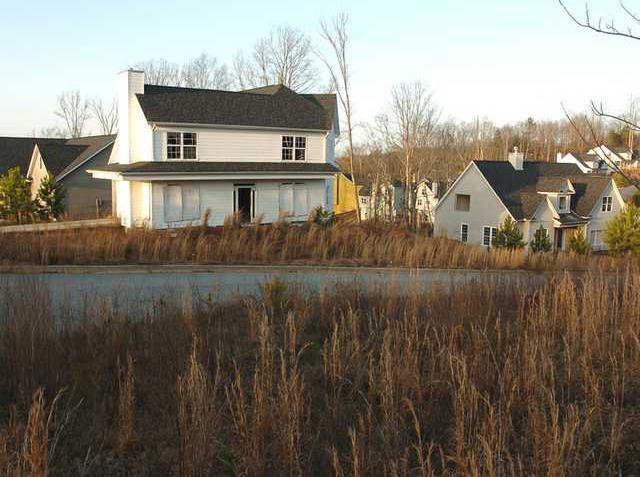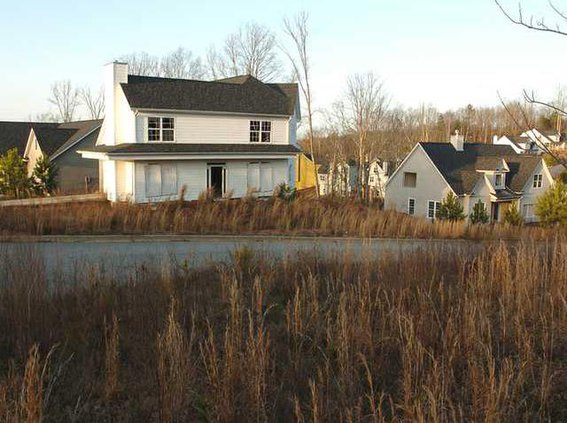Buyers of lots in a northeastern Forsyth County subdivision, beware.
Properties in the unfinished Greenleaf neighborhood, once the subject of a builder-based mortgage fraud scheme, now will come with a warning on record.
The move came about thanks to a 5-0 vote Tuesday by Forsyth County commissioners to add a disclaimer.
The "deficiencies" of the subdivision will be filed at the clerk's office with the final plat so purchasers will more easily know what they're getting, County Attorney Ken Jarrard said.
"There are a host of issues in the subdivision," Jarrard said. "To say that the subdivision has been plagued by some problems since its inception would be a bit of an understatement."
The 40-acre neighborhood off Ga. 53 near the Dawson County line was slated to be developed in 2004.
The final plat, approved on Dec. 29 of that year, showed that each of the about 0.2-acre lots was serviced by a septic tank with a communal drain field, Jarrard said.
That infrastructure, however, does not exist on the site, he said, though the final plat would indicate falsely that the subdivision is "shovel-ready."
Since county regulations no longer allow septic on lots that small and the permits have expired, public sewer would be required, Jarrard said. Yet sewer lines do not reach that area of the county.
He added that no deeds were ever recorded for the subdivision, which has several other issues including a lack of electricity and the county not accepting the roads.
"The county's never issued a certificate of occupancy for anything on that property, not even the model home," Jarrard said. "At this juncture, no building permits will be issued."
The county's concern over Greenleaf was triggered by the tax commissioner selling lots in a tax sale, as he would with any delinquent property, Jarrard said.
Tax Commissioner Matthew Ledbetter said after the meeting that some lots sold last year on the courthouse steps.
"They rolled up for auction, and to be consistent with every parcel in the county, we had to auction some of those off," Ledbetter said. "Most of them just went for the taxes that were due."
Due to the discussion and commissioner's action on Tuesday, he plans to put those sales on hold, and follow the instructions of the county attorney on how to move forward.
Developers have always been able to learn of the discrepancies and problems with any subdivision by checking the records within the departments, said John Cunard, county director of engineering.
"Georgia is a buyer-beware state, so they buy it at their own risk if they don't do their due diligence," Cunard said.
In addition to the issues with the final plat, 14 lots on the site continue to accrue $12,250 in fines daily for erosion and sedimentation control violations, he said.
"The property's not worth the fines," Cunard said. "In fact, the property's probably not worth anything with what's got to be done to redevelop it."
The department last tallied the total owed in March 2010 to be more than $11 million.
A county resolution allows for a possible reduction of fines to a maximum of $50,000 with an agreement to correct the violations on foreclosed properties, he said.
The commission approved such an agreement for a developer who remediated a subdivision that had been built around a landfill. It had accumulated to more than $2 million.
In Greenleaf's case, "nobody's been willing to take on the task yet," Cunard said.
And while the neighborhood remained unfinished, some of those connected with the stalled development received time in prison.
Darryl L. Cooper was sentenced in January 2008 to one year, six months in federal prison for creating fraudulent appraisals that reflected completed construction of the homes in the neighborhood.
A federal judge also sentenced one of the subdivision's developers, Jeffery Alan Teague, in October 2007 to 15 years, eight months in prison.
Both men were also ordered to pay millions of dollars in restitution.
The charges against Teague were based on two builder-based mortgage fraud schemes involving $15 million in fraudulent loans on unfinished or nonexistent homes in Forsyth and Rockdale counties, according to the U.S. Attorney's Office Northern District of Georgia.

